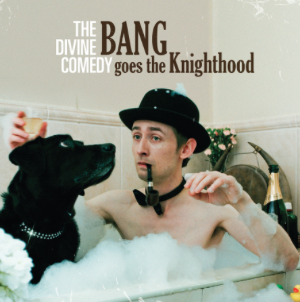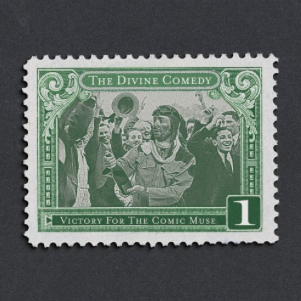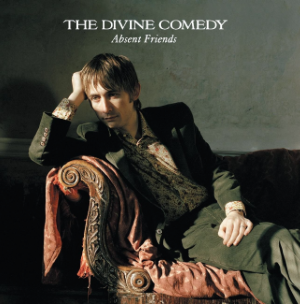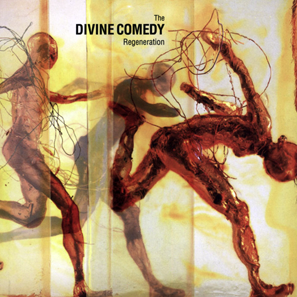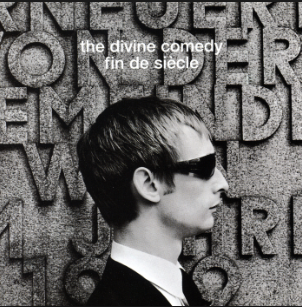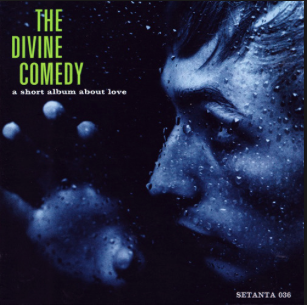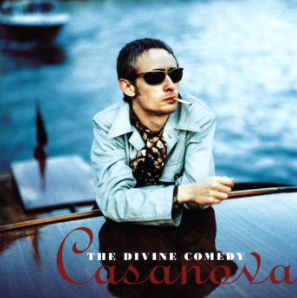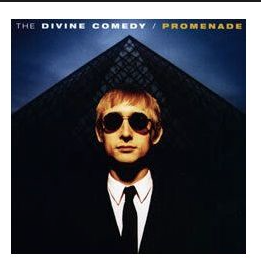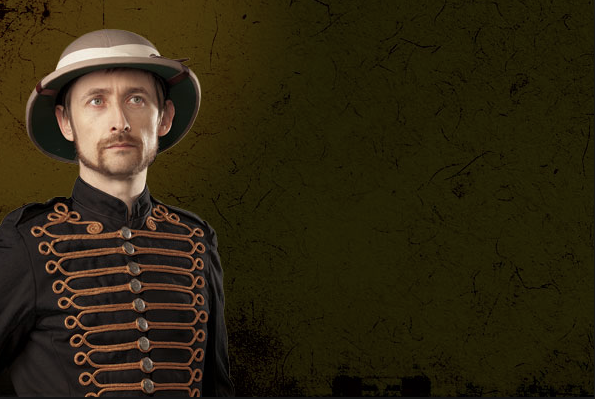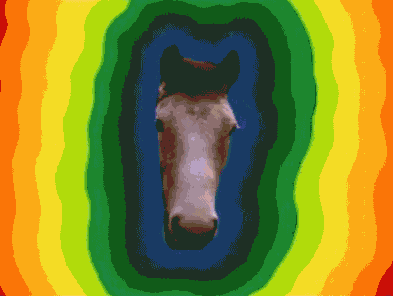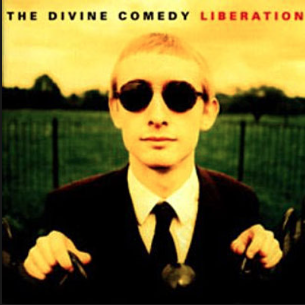
Spotify link
CHRIS
As my wife knows well – and indeed anyone within earshot in the last few weeks – I am very apprehensive about this month. The Divine Comedy, or Neil Hannon in particular, are a band that come with a heavy weight of prejudices: incredibly annoying; smug singer; a smattering of catchy songs; a dearth of impenetrable and grindingly unnecessary literary and cultural references. I could see this month as being a slog.
To assure myself, I did what I always do before listening to an album for the blog: I looked it up on Wikipedia. This is what I found:
“Several of the songs are inspired by (or refer to) works of literature: “Bernice Bobs Her Hair” is based on the short story of the same name by F. Scott Fitzgerald; “Three Sisters” is about the play of the same name by Anton Chekhov; “Lucy” is an amalgamation of three of the Lucy poems by William Wordsworth; “Timewatching” is inspired by the popular song “When I Fall In Love”; “Death of a Supernaturalist” is preceded by a quote from A Room with a View by E. M. Forster, spoken by Julian Sands and Daniel Day-Lewis and sampled from the Merchant-Ivory film of the same name. More playfully, “Festive Road” is a tribute to the children’s television programme Mr Benn.”
Go back and read that again. And again.
I almost gave up on the spot. This feels like a deliberate attempt to prove a point; the point being: ‘Look how many books I have read that you didn’t bother reading when you were studying English Literature at school”. I am not against these kinds of references, in fact, I revel in many bands who did things like this. But, these particular reference points – ‘the classics’ – along with my prior image of the band, this only reasserted what I felt to be the worse. The image of a guy sat in the corner, pipe in tow, extolling the virtues of Keats and Yeats. You know the guy – and it is usually a guy – I mean.
So, what actually happened when I pressed play?
Firstly, it was nowhere near as bad as it could have been. ‘Lucy’ is a nice song with some warm strumming and ‘The Pop Singers Fear of the Pollen Count’ is hard to not like (I do remember liking this when I was younger).
Problem is, that is the two standard models on this album: the big bouncy horn laden song, and the slightly more reserved pop number. And this is repeated over, and over, and over again. This album was a slog. It wasn’t that I particularly hated it at any point, I just felt that I was stuck in a loop. It reminded me of listening to Hannon’s touring partner in crime, Ben Folds. His albums – on average – have about three (sometimes less) good songs and the rest are pale imitations of those – I did enjoy this more than any Ben Folds album, though.
Also, as expected, I did find Hannon’s demeanour a bit hard going. Whilst he probably thinks – and correct me if I am wrong – that acting like a British aristocrat is fun and endearing, it becomes plain annoying. It was like being dragged round a National Trust property with an overzealous, secretly posh, friend.
So, overall, it was ok. I think that if he tones down the twee and artifice I might get on board with it. If he pushed it more in the direction of the Decemberists – talking about history rather than trying to be it – I can see some great songs. Hannon, this is your challenge.
ROB
As I established in my opening blog, my Artist in Residence experience for the month is something of a saucy little three-way between Dante, Neil Hannon and myself. I imagine it to be something akin to Come Dine With Me, with me playing the role of the straight-man as Hannon and Dante lurch from crisis to disaster…
Dante, it has to be said, is having a pretty shit time of things. He’s been trying to get somewhere yet has been railroaded by three animals – a wolf, a leopard and a lion. Armed with my B in English literature A Levels, I’m gonna stick my neck out and say these three animals are allegories for vices that stop you getting into heaven, meaning Dante’s forced to ask for help from some angels. That’s as far as I got, but I’m not hopeful for our hero (spoiler alert: I already know the Divine Comedy is about Dante’s journey through the levels of hell – so yeah, I’m guessing those angels are pretty fucking useless).
Hannon, on the other hand, seems to be enjoying himself. I imagine him writing music in a turtleneck, supping on a pipe while a kitten plays with a ball of string. He’ll laugh gaily every now and then when he conjures up a funny line or evokes a particular image, self-satisfied in his smugness…
Whisper it quietly but I didn’t actually hate ‘Liberation’. Some of it’s annoying – real fucking annoying – but a lot of it reminded me of of Montreal’s ‘Satanic Panic In the Attic’ – my favourite of Montreal record. If this is what we’re in for all month, I might actually emerge unscathed on the other side. Unlike Dante…
MARTIN
I’ve made no secret of the fact that I haven’t been looking forward to Divine Comedy month. My experience of them, however small, leads me to believe that I will gain no pleasure whatsoever from listening to these albums.
Liberation appears to confirm this when I start to play it. I used to love the children’s cartoon Mr Benn when I was a kid. But never once did I think , “Do you know what? This would lend itself well to being the subject of a dreary piano ballad as the first track of a debut album”. Because it doesn’t. This track is shockingly dismal.
Then something unexpected happens. The next two tracks, Death of a Supernaturalist and Bernice Bobs Her Hair pass by and I quite enjoy them. Good melodies. Kind of like Belle and Sebastian on their more bouncy moments. I feel like I could have spoken far too soon.
However, the rest of the album neither irks me nor jerks me. It’s simply a present sound, floating along forgettably with only a couple more songs which vaguely prick up my ears. The Pop Singer’s Fear of the Pollen Count and Lucy peep their heads marginally over the ramparts of mediocrity, only to get shot in the face by my general apathy.
So in summary it’s much better than I expected. But as I expected so little, that is not much praise I’m afraid. Some of my AIR colleagues have listened further and noted that it stays pretty samey. I’m hoping there will still be the occasional gem because at least there are two decent songs on this record which I wouldn’t turn off if I heard them again.
JAMIE
I stick on Liberation and about four songs in I think to myself, ‘this really is pleasant.’ It reminds me of vanilla ice cream, in a nice way. What’s wrong with vanilla anyway? It’s better than dog shit and broken glass flavour. I had my fill of that during Sonic Youth month incidentally.
About halfway through the album, I totally zone out. I start thinking of items I need to pick up from the shops.
1. Lemonade.
2. Shit tickets.
3. Crisps.
4. Limes…
That’s the main problem with this album. It’s really quite boring in its entirety. There are some stand out songs however. Death of a Supernaturalist is great. I actually really like Your Daddy’s Car too. The Pop Singer’s Fear of the Pollen Count is decent too (such a Morrissey song title that) despite including potent levels of extra mature cheddar in the lyrics.
As a debut, it’s not a bad record overall. It’s main problem is it’s too long at 13 tracks. 3 songs could easily have been trimmed off and it would have been stronger overall.
LUKE
The first track of the month was Festive Road. Listening to it was very much like standing at the foot of a mountain and finding you have no boots on. And the only music on your iPod is the Divine Comedy. And you strongly suspect you won’t like the Divine Comedy. And the mountain is actually a massive pile of agitated bears.
Why the trepidation? It’s remarkable how convinced I seem to be of what to expect despite only knowing a handful of songs from a lengthy career. This may well be a commendable thing. For better or worse, Neil Hannon has acquired a reputation that precedes him. That has to be better than being boring.
Such a reputation is justified in part by this album’s litany of twee song titles. It is a collection of the dowdiest jumble of words I have ever seen, evoking images of lazily thumbing through charity shop bric-a-brac on a rainy day. If you don’t believe me, have a look at the track listing for yourself:
The Battenberg Imbroglio
Your Pantaloons
Awash With Love
Deirdre Makes The Sandwiches
Wonderful Time At The Summer Fete
Grandmother Is Lovely
Larks!
On Liking You Lots
Kindly Uncle George
Me and Crumpets
None of those tracks are real of course, but the point they make most certainly is. It’s all so fey. I want to punch him about his face. There is a clear Beatles influence (Death of a Supernaturalist bears traces of Eleanor Rigby), and some of the song titles and lyrics are redolent of Morrissey. Such influences should bring more bite than this though. It’s pop as imagined by a man who never saw a nice china teapot he didn’t like.
I Was Born Yesterday starts off well, with a stomping, almost glam-rock beat, until a spoken-word passage that is the very epitome of insipid. It rivals M83’s Graveyard Girl as a good song ruined by an ill-advised monologue.
There are some high points. Europop and The Pop Singer’s Fear Of The Pollen Count are the first additions to my Best Of compilation. They are the sound not just of nicey-nicey vocals and electric organs, but of hope. More of this sort of thing and we might get along just fine.
RORY
August has traditionally been referred to as a month of grave injustice in my household. My mum’s often cited legal battle with the council over her refusal to cut an overhanging holly bush, which was as the council said ‘making it almost impossible to navigate the pavement’, came to a head around mid-August ’95 leading her to remove said bush and spend a cool two month stretch pruning park bushes in a run down Beckenham park as a punishment.
Say what you want about my mum, but she’s a woman of principle.
Anyway, August is here again. How do I know that you may ask? Well, I checked my phone and I’m 80% sure my calendar is accurate.
Upon hearing that we were listening to The Divine Comedy I feared another grave injustice would be inflicted upon me. A summer of ’95 if you will.
However Liberation is ok.
It has given me three songs I would listen to again. Bernice Bobs Her Hair, I Was Born Yesterday and Europop. I actually really love Bernice Bobs Her Hair, so thank you Neil.
It has also displeased me. I feel like if Death of a Supernaturalist was a person it would be dressed like Elton John on his wedding day, go by the name Marquis Le Flume and pickpocket poor people despite being obscenely rich. Your Daddy’s Car sounds like Marquis Le Flume mixed with the Sims.
As I review each album I will be taking particular interest in how Marquis Le Flume each album is. Harpsichord should only be used in Victorian dramas and sparingly at that.
Liberation is a mixed bag. I’m mostly indifferent to it. Roll on Promenade.
